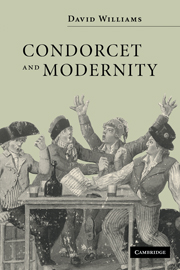Book contents
- Frontmatter
- Contents
- Acknowledgements
- References and abbreviations
- Introduction
- 1 Profile of a political life
- 2 Human nature and human rights
- 3 The civil order
- 4 Managing enlightenment
- 5 Reform and the moral order
- 6 New constructions of equality
- 7 Justice and the law
- 8 Representative government
- 9 The economic order
- 10 Managing the Revolution
- Conclusion: the human odyssey
- Bibliography
- Name index
- Subject index
9 - The economic order
Published online by Cambridge University Press: 22 September 2009
- Frontmatter
- Contents
- Acknowledgements
- References and abbreviations
- Introduction
- 1 Profile of a political life
- 2 Human nature and human rights
- 3 The civil order
- 4 Managing enlightenment
- 5 Reform and the moral order
- 6 New constructions of equality
- 7 Justice and the law
- 8 Representative government
- 9 The economic order
- 10 Managing the Revolution
- Conclusion: the human odyssey
- Bibliography
- Name index
- Subject index
Summary
Condorcet did not write extensively or systematically on economics, although he is the author of a number of pioneering works devoted to specific economic issues relating to taxation reform, public finance, debt, insurance, annuities, tariffs and free trade. In these texts he had much to say about financial reforms and the creation of a revitalised infrastructure to underpin a stable and productive economic order. The Réflexions sur le commerce des blés (Reflections on the grain trade), published in 1776, is the most substantial. Written in defence of Turgot's policies, the Réflexions represents Condorcet's most sustained analysis of the benefits of free trade but, as with so many of his economic writings, the elucidation of economic principle is narrowly focussed, intersects with social and moral issues and is confined to a single, though centrally important, aspect of contemporary public policy, in this case the management of periodic bread shortages and the desperate plight of the poor arising from harvest failure. The historical specificity of the Réflexions, and indeed of the majority of Condorcet's economic writings, has ensured that his achievements as an economist have been largely obscured until the late 1980s.
With the exception of the Rèflexions, the Lettre d'un laboureur de Picardie à m. N*, auteur prohibitif, à Paris (1775), Monopole et monopoleur (1775), the Réflexions sur les corvées (1775), Sur l'abolition des corvées (1776) and a number of essays and pamphlets dedicated to technical aspects of fiscal and monetary reform, issued mainly after 1789, Condorcet's wider-ranging economic pronouncements tend to be buried as chapters or sub-sections in works on other subjects such as the Vie de m. Turgot, the Essai sur la constitution et les fonctions des assemblées provinciales, the notes for Roucher's translation of Adam Smith's Wealth of Nations and the Fragment of the tenth époque of the Esquisse.
- Type
- Chapter
- Information
- Condorcet and Modernity , pp. 225 - 249Publisher: Cambridge University PressPrint publication year: 2004

